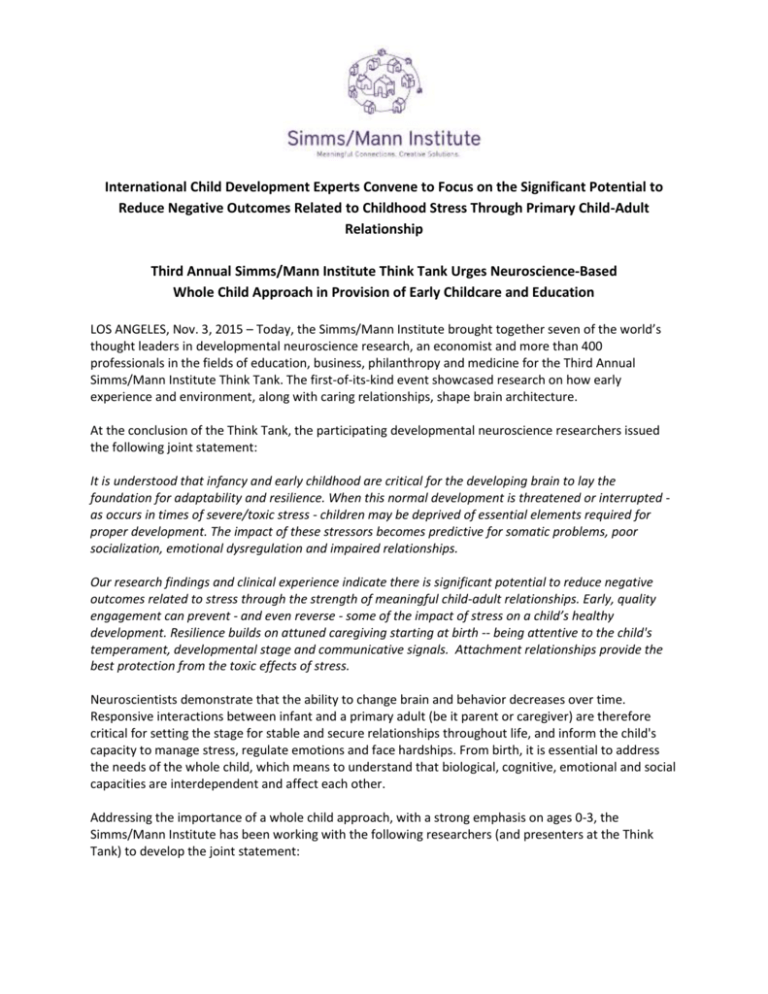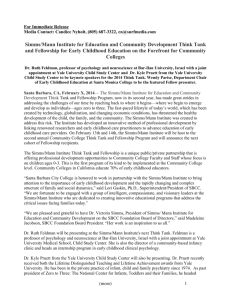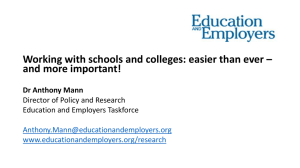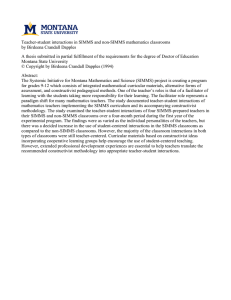Simms/Mann Institute Faculty Fellowship Press Release
advertisement

International Child Development Experts Convene to Focus on the Significant Potential to Reduce Negative Outcomes Related to Childhood Stress Through Primary Child-Adult Relationship Third Annual Simms/Mann Institute Think Tank Urges Neuroscience-Based Whole Child Approach in Provision of Early Childcare and Education LOS ANGELES, Nov. 3, 2015 – Today, the Simms/Mann Institute brought together seven of the world’s thought leaders in developmental neuroscience research, an economist and more than 400 professionals in the fields of education, business, philanthropy and medicine for the Third Annual Simms/Mann Institute Think Tank. The first-of-its-kind event showcased research on how early experience and environment, along with caring relationships, shape brain architecture. At the conclusion of the Think Tank, the participating developmental neuroscience researchers issued the following joint statement: It is understood that infancy and early childhood are critical for the developing brain to lay the foundation for adaptability and resilience. When this normal development is threatened or interrupted as occurs in times of severe/toxic stress - children may be deprived of essential elements required for proper development. The impact of these stressors becomes predictive for somatic problems, poor socialization, emotional dysregulation and impaired relationships. Our research findings and clinical experience indicate there is significant potential to reduce negative outcomes related to stress through the strength of meaningful child-adult relationships. Early, quality engagement can prevent - and even reverse - some of the impact of stress on a child’s healthy development. Resilience builds on attuned caregiving starting at birth -- being attentive to the child's temperament, developmental stage and communicative signals. Attachment relationships provide the best protection from the toxic effects of stress. Neuroscientists demonstrate that the ability to change brain and behavior decreases over time. Responsive interactions between infant and a primary adult (be it parent or caregiver) are therefore critical for setting the stage for stable and secure relationships throughout life, and inform the child's capacity to manage stress, regulate emotions and face hardships. From birth, it is essential to address the needs of the whole child, which means to understand that biological, cognitive, emotional and social capacities are interdependent and affect each other. Addressing the importance of a whole child approach, with a strong emphasis on ages 0-3, the Simms/Mann Institute has been working with the following researchers (and presenters at the Think Tank) to develop the joint statement: Dr. Adele Diamond, Tier 1 Canada Research Chair Professor of Developmental Cognitive Neuroscience at University of British Columbia Dr. Ruth Feldman, Professor of Psychology and Neuroscience at Bar-Ilan University, Israel, with a joint appointment at Yale University Medical School, Child Study Center Dr. Peter Fonagy, Freud Memorial Professor of Psychoanalysis and Head of the Research Department of Clinical, Educational and Health Psychology at University College London, Chief Executive at the Anna Freud Centre, London Dr. Nathan Fox, Distinguished University Professor and Director, Child Development Laboratory, University of Maryland Dr. Patricia Kuhl, Bezos Family Foundation Endowed Chair in Early Childhood Learning and CoDirector of the UW Institute for Learning and Brain Sciences, Director of the University of Washington’s NSF Science of Learning Center, and Professor of Speech and Hearing Sciences at the University of Washington Dr. Pat Levitt, Simms/Mann Chair in Developmental Neurogenetics at Children’s Hospital Los Angeles and the WM Keck Provost Professor of Neurogenetics at the Keck School of Medicine of the University of Southern California Dr. Alicia Lieberman, Professor, School UCSF School of Medicine, Department of Psychiatry Arthur Rolnick, Senior Fellow and Co-Director of the Human Capital Research Collaborative at the Humphrey School of Public Affairs, the University of Minnesota In further support of the whole child approach, the Simms/Mann Institute also has created a publicprivate partnership with the Simms/Mann Institute Faculty Fellowship. This program seeks to bridge the gap between developmental neuroscience research and on-the-ground early care and education by advancing quality training and recognition of the childcare workforce. Thirteen faculty members from California Community Colleges and The California State University were chosen to become the 2015 Simms/Mann Institute Faculty Fellows, spending one year completing a project that translates neuroscience into practical research tools. About Simms/Mann Institute The Simms/Mann Institute for Education and Community Development was established in 2011 to address the complex issues facing families today. Technological advances, rapid globalization, and unpredictable economic conditions have fostered a competitive, over-stimulating, and stressful environment that threatens the healthy development of children and families in our communities. The Institute is unique in its philanthropic efforts by being positioned at the nexus of authentic, real-world solutions. For more information, visit www.simmsmanninstitute.org. ###











